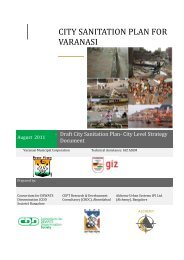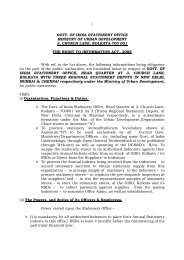CITY SANITATION PLAN - Ministry of Urban Development
CITY SANITATION PLAN - Ministry of Urban Development
CITY SANITATION PLAN - Ministry of Urban Development
You also want an ePaper? Increase the reach of your titles
YUMPU automatically turns print PDFs into web optimized ePapers that Google loves.
<strong>CITY</strong> <strong>SANITATION</strong> <strong>PLAN</strong> BAREILLY<br />
determine budget utilization, actual resource flows from different sources, and value for money actually<br />
achieved. Despite its importance, while developing performance monitoring for sanitation it is necessary<br />
to address constraints related to difficulty in measuring health and hygiene related outcomes and their<br />
attribution to sanitation measures. Given the household and community focus in sanitation appropriate<br />
institutional mechanisms are also needed for their participation in performance monitoring. Emphasis<br />
on performance monitoring is also required because <strong>of</strong> limited experience in scaling up approaches.<br />
Thus, synthesized feedback provided by a good performance monitoring system to policy makers is<br />
essential for continuously assessing their effectiveness and making the necessary mid-course<br />
corrections.<br />
Monitoring is a management tool that is intended to provide managers with information about how an<br />
initiative or process is performing. Monitoring takes place at intervals throughout the life <strong>of</strong> the<br />
sanitation initiative or process. Examples include monitoring <strong>of</strong> the quality <strong>of</strong> materials used in the<br />
implementation <strong>of</strong> a new sanitation initiative and monitoring <strong>of</strong> the effluent quality produced by a<br />
treatment facility.<br />
Evaluation takes place after the completion <strong>of</strong> an initiative or programme. It aims to answer such<br />
questions as were the intended objectives achieved, was the expenditure as expected and did the right<br />
people benefit as intended.<br />
The key functions <strong>of</strong> agencies in the sanitation sector are policy formulation, regulation, investment,<br />
operations and maintenance <strong>of</strong> sanitation facilities, and the commercial activity <strong>of</strong> supplying the needy<br />
with desired sanitation services. Traditionally, these functions have been carried out in most <strong>of</strong> the cities<br />
in a supply-driven way with a high degree <strong>of</strong> centralized control, little local accountability, and little<br />
involvement <strong>of</strong> consumers. The consequence has been failure to cope with the growing problems <strong>of</strong><br />
urban sanitation.<br />
Monitoring and evaluation <strong>of</strong> city sanitation plan has three purposes:<br />
To evaluate the effectiveness <strong>of</strong> the planning process, or assess the effectiveness <strong>of</strong> the phases<br />
in the preparation <strong>of</strong> the city sanitation plan, including sanitation mapping, defining the<br />
sanitation development framework, and preparation <strong>of</strong> reports. The results <strong>of</strong> the evaluation<br />
ADMINISTRATIVE STAFF COLLEGE OF INDIA, HYDERABAD Page 202
















